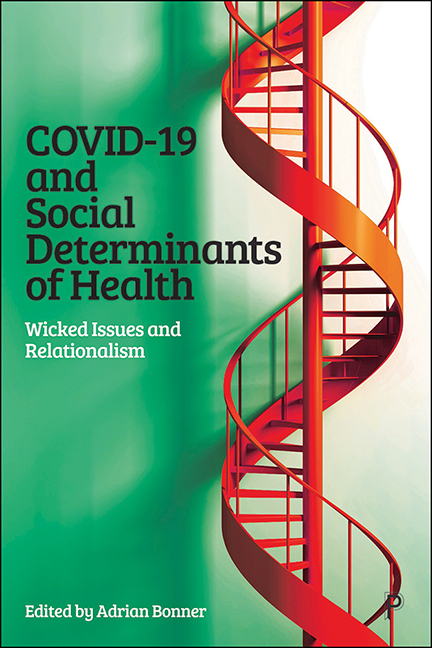Book contents
- Frontmatter
- Miscellaneous Frontmatter
- Contents
- List of figures and tables
- Notes on contributors
- Foreword
- Introduction
- Part I Wicked issues and relationalism
- Part II Regionalism and geopolitical environments
- Part III Public sector, COVID-19 and culture change
- Part IV The third sector
- Part V The case for relationalism
- Part VI Engagement and proposed changes
- Conclusion
- Appendix The Centre for Partnering
- Index
6 - UK local council strategies post-COVID-19: the local economy, climate change and community wellbeing
Published online by Cambridge University Press: 18 January 2024
- Frontmatter
- Miscellaneous Frontmatter
- Contents
- List of figures and tables
- Notes on contributors
- Foreword
- Introduction
- Part I Wicked issues and relationalism
- Part II Regionalism and geopolitical environments
- Part III Public sector, COVID-19 and culture change
- Part IV The third sector
- Part V The case for relationalism
- Part VI Engagement and proposed changes
- Conclusion
- Appendix The Centre for Partnering
- Index
Summary
Introduction
Around five times a year, the 54 elected representatives of the London Borough of Sutton gather for a ‘Full Council’ meeting. It allows the public and backbench councillors to challenge the executive in local government’s own style of Prime Minister’s Questions and for political parties to trade punches on a wide range of local and national issues. These public meetings, held in mostly empty school halls, with all too often unreliable technology and without the national media spotlight, are where local democracy comes to life.
It is in this context that Sutton councillors met on a sweltering July evening in 2019. On the agenda, ‘Sutton Council to declare a Climate Emergency’. A no-brainer as far as we, the Sutton Liberal Democrat administration, were concerned. To our surprise, the hall of Wallington County Grammar High School was packed. ‘Extinction Rebellion Sutton’ had mobilised dozens of local residents for the occasion.
As the debate progressed, it was easy to get carried away by the fervour and enthusiasm displayed by ‘XR’ activists. Their energy put a local face to the mass climate movement inspired by Greta Thunberg in 2018 and signalled a potential shift in public opinion. An Ipsos MORI poll in August 2019 showed that concern about climate change has reached record levels, with half now ‘very concerned’ and the majority thinking that the UK should bring all emissions to net zero sooner than by 2050 (Ipsos MORI, 2020). It’s hard to imagine that the UK government would have single-handedly adopted a legally binding target to be carbon-neutral by 2050 and that 270 local authorities in the UK would have declared a ‘Climate Emergency’ had it not been for the momentum gathered by the highly mediatised climate protests in the UK and around the world.
However, as I listened to their speeches, I was also brutally aware that while on paper green initiatives are extremely popular, many of our residents are still unaware of the practical implications of these policies on their lives and the tough choices needed to achieve them.
- Type
- Chapter
- Information
- COVID-19 and Social Determinants of HealthWicked Issues and Relationalism, pp. 100 - 113Publisher: Bristol University PressPrint publication year: 2023



